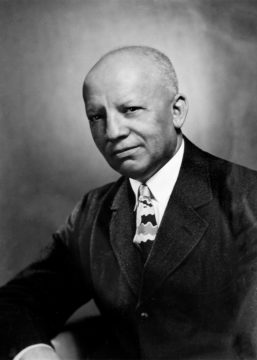Liz Mineo in Harvard Gazette:
 In his book “Fugitive Pedagogy: Carter G. Woodson and the Art of Black Teaching,” Jarvis R. Givens, assistant professor at the Harvard Graduate School of Education and the Suzanne Young Murray Assistant Professor at the Radcliffe Institute for Advanced Study, tells the little-known story of Woodson, a groundbreaking historian and the founder of Black History Month. The Gazette spoke with Givens about Woodson, who popularized Black history and joined efforts with a legion of African American teachers during the Jim Crow era to celebrate the contributions of Black people in the nation’s history. This interview was edited for clarity and length.
In his book “Fugitive Pedagogy: Carter G. Woodson and the Art of Black Teaching,” Jarvis R. Givens, assistant professor at the Harvard Graduate School of Education and the Suzanne Young Murray Assistant Professor at the Radcliffe Institute for Advanced Study, tells the little-known story of Woodson, a groundbreaking historian and the founder of Black History Month. The Gazette spoke with Givens about Woodson, who popularized Black history and joined efforts with a legion of African American teachers during the Jim Crow era to celebrate the contributions of Black people in the nation’s history. This interview was edited for clarity and length.
GAZETTE: Carter G. Woodson is known as the father of Black history. How did his life inform his development as a teacher, thinker, and scholar?
GIVENS: It’s always important to start with the fact that Carter G. Woodson was both the child and the student of formerly enslaved people before we emphasize that in 1912, he became the second Black person to receive a Ph.D. from Harvard. He was born in 1875 and grew up working on his family’s farm. His first teachers were his formerly enslaved uncles who taught him in a one-room schoolhouse in Buckingham County, Virginia. He worked in the coal mines before he started high school at the age of 20 and worked alongside formerly enslaved men and Civil War veterans who were illiterate, men who relied on Woodson to read to them in the evenings. It was in those experiences that Woodson came to learn that Black people carried important knowledge from their lived experiences that needed to be taken seriously and preserved. In 1915, he created the Association for the Study of Negro Life and History while he worked as a teacher during Jim Crow, and then went on to become the man that people refer to as the “father of Black history.” As an educator and institution-builder Woodson popularized Black history and celebrated the contributions of Black people in American history, and as a scholar, his books indicted the American school system for the various forms of violence it inflicted upon Black people.
More here. (Note: At least one post throughout the month of February will be devoted to Black History Month. The theme for 2022 is Black Health and Wellness)
